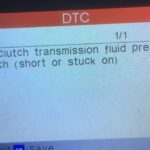Connecting your smartphone or tablet to your car’s onboard diagnostics system (OBD) opens up a world of information about your vehicle’s health and performance. To bridge this connection, you need a reliable OBD2 adapter. This guide will help you navigate the world of Obd2 Adapters, ensuring you choose the right one for your needs.
An OBD2 adapter facilitates communication between diagnostic software, like Car Scanner, and your car’s engine control unit (ECU). Choosing the correct adapter is crucial for a stable connection and accurate data retrieval. Factors like connection type and adapter quality significantly impact performance.
Types of OBD2 Adapters by Connection
OBD2 adapters utilize various connection methods to link with your device:
-
WiFi OBD2 Adapters: These adapters create a wireless local area network to connect to your smartphone or tablet. While offering flexibility, WiFi adapters can sometimes experience connection instability, especially if your device automatically switches between WiFi networks.
-
Bluetooth OBD2 Adapters: Utilizing classic Bluetooth (versions 1.x, 2.x, 3.x), these adapters offer a reliable and widely compatible connection for Android devices. They generally provide faster data transfer speeds compared to Bluetooth LE. However, simultaneous connection with other Bluetooth devices, like car audio systems, might cause interference on some Android devices.
-
Bluetooth LE (Low Energy) OBD2 Adapters: These adapters use Bluetooth 4.0 and above, prioritizing low power consumption. They are ideal for iOS devices (iPhone/iPad) due to compatibility and ease of connection. While generally slower than classic Bluetooth, they offer a stable connection.
-
Bluetooth MFi OBD2 Adapters: These specialized adapters use classic Bluetooth but are certified by Apple (MFi – Made for iPhone/iPad). This certification ensures seamless integration with iOS. While offering excellent performance, they are typically more expensive. Examples include OBDLink MX+ and vLinker FS. They function as regular Bluetooth adapters on Android devices.
-
USB OBD2 Adapters: While available, USB adapters are not supported by many popular diagnostic apps like Car Scanner.
Selecting a Quality OBD2 Adapter: Avoiding Common Pitfalls
The market is flooded with OBD2 adapters, and unfortunately, not all are created equal. A “bad” adapter can lead to a range of issues:
- Connectivity Problems: Unreliable connections, intermittent dropouts, or complete failure to connect.
- Data Errors: Inaccurate readings, missing data packets, or corrupted information.
- Compatibility Issues: Limited support for specific car makes and models or diagnostic commands.
- ECU Interference: In severe cases, a faulty adapter can disrupt the ECU’s operation, potentially affecting engine performance.
Recommended OBD2 Adapters
Based on user experience and reviews, the following OBD2 adapters are generally considered reliable:
-
OBDLink MX+ (Bluetooth MFi): A premium, high-performance adapter suitable for both iOS and Android. Offers fast data transfer speeds and wide compatibility.
-
OBDLink CX (Bluetooth LE): An excellent choice for iOS and Android, providing a large memory buffer and reliable performance.
-
vLinker Series (Bluetooth LE/MFi): Offers various models, including the MC+, FS, and MS, catering to both iOS and Android. Ensure firmware is updated for optimal performance.
-
Vgate iCar Pro 2S (Bluetooth): A newer model replacing the iCar Pro BLE. It’s an improved version offering better performance and compatibility.
-
Vgate iCar Pro BLE (Bluetooth): Compatible with both classic Bluetooth and Bluetooth LE, making it suitable for various operating systems. Requires firmware updates for certain vehicle compatibility.
OBD2 Adapters to Avoid
Certain types of OBD2 adapters are known for poor performance and should be avoided:
- xTool Adapters: Not compatible with standard ELM327 software.
- Wired Adapters (USB/COM): Not supported by many wireless diagnostic apps.
- “Mini” Adapters: Often associated with low quality and reliability issues.
- Cheap Adapters (Under $10): Quality is often compromised at very low price points.
- Specific Brands/Models: Adapters with MAC addresses starting with 11:22:33 or 00:00:00, KONNWEI, “Micro Mechanic,” “THINMI.COM,” and “KUULAA” are often reported to have issues.
Choosing the right OBD2 adapter is crucial for accurate car diagnostics. Consider your device’s operating system, budget, and desired performance when making your selection. Opting for a reputable brand and avoiding known problematic models will greatly increase your chances of a successful diagnostic experience.


